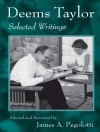Listen to David Hesmondhalgh discuss the arguments at the core of ‘Why Music Matters’ with Laurie Taylor on BBC Radio 4’s Thinking Allowed here: www.bbc.co.uk/iplayer/episode/b03q9q2n/Thinking_Allowed_Why_Music_Matters_Bhangra_and_Belonging/
In what ways might music enrich the lives of people and of societies? What prevents it from doing so? Why Music Matters explores the role of music in our lives, and investigates the social and political significance of music in modern societies.
* First book of its kind to explore music through a variety of theories and approaches and unite these theories using one authoritative voice
* Combines a broad yet theoretically sophisticated approach to music and society with real clarity and accessibility
* A historically and sociologically informed understanding of music in relation to questions of social power and inequality
* By drawing on both popular and academic talk about a range of musical forms and practices, readers will engage with a wide musical terrain and a wealth of case studies
Daftar Isi
1 Music as Intimate and Social, Private and Public 1
2 Feeling and Flourishing 11
2.1 Music, Affect, Emotion 11
2.2 Emotions, Narrative Play, and Music 14
2.3 Human Flourishing, Aesthetic Experience, and Music 17
2.4 Musical Flourishing Beyond Contemplative Cultivation 20
2.5 Musical Aesthetics and Bodily Experience: Dancing 30
2.6 Approaches to Music and Emotion in Everyday Life:
Contributions and Limitations 35
2.7 Problems of Self-realization in Modern Life and Their
Relation to Music 42
2.8 Competitive Individualism and Status Competition Through
Music 48
2.9 Review: Music’s Constrained Enrichment of Lives 53
3 Love and Sex 57
3.1 Sex and Love and Rock and Roll 57
3.2 Two Approaches to Music, Sex, and Sexuality 58
3.3 The Pop-Rock Divide and Rock’s Sexual Politics 61
3.4 Post-War Pop’s Emotional Resources 65
3.5 Sex and Love on the Dance Floor 68
3.6 Critiques of Countercultural Sexual Freedom 71
3.7 Sex and Love in Punk, Alternative Rock, and Metal 74
3.8 Sexuality in Twenty-First-Century Pop 77
3.9 Black Music and Racialized Sexuality 81
4 Sociability and Place 84
4.1 Ways of Being Together: Forms of Publicness 84
4.2 Celebrations of Musical Participation and Their Limitations
87
4.3 That Syncing Feeling 97
4.4 Ordinary Sociability I: Singing Together 102
4.5 Ordinary Sociability II: Dancing Together 109
4.6 Playing Together: Amateur Musicians 112
4.7 Theorizing Positive Musical Sociality 115
4.8 Spectres of Capitalist Modernity Revisited: Class and
Inequality 120
4.9 Uneven Musical Development 123
4.10 Elements of Thriving Musical Places 125
4.11 Quality of Working Life of Professional Musicians 127
5 Commonality and Cosmopolitanism 130
5.1 Mediated Commonality in Modern Societies 130
5.2 Aesthetic Experience and Aspirations to Commonality 131
5.3 Redeeming Aesthetic Experience? 133
5.4 Talk About Music, What It Tells Us, and What It
Doesn’t 136
5.5 Music, Politics, and Publicness 142
5.6 Communities of Shared Taste? Subcultures, Scenes, and Fans
147
5.7 Nations, Ethnicity, Cosmopolitanism 151
5.8 Rock as Cosmopolitanism? 152
5.9 Complexities of Music and Nation 155
5.10 Strange Journeys: Working-Class and Ethnic Musics Become
National Musics 157
5.11 Sentimental Citizenship 162
5.12 Music, the Nation, and the Popular 164
5.13 Music of the African Diaspora: Life-Affirming Collectivity
in Decline? 165
5.14 A Critical Defense of Music 170
Acknowledgments 172
References 174
Index 187
Tentang Penulis
David Hesmondhalgh is Professor of Media and Music Industries at the University of Leeds. He is the author of The Cultural Industries, now in its third edition (2013) and co-author (with Sarah Baker) of a study of working life in three cultural industries, including music, Creative Labour (2011). He is also the editor or co-editor of various collections, including Western Music and its Others (with Georgina Born, 2000) and Popular Music Studies (with Keith Negus, 2002).












